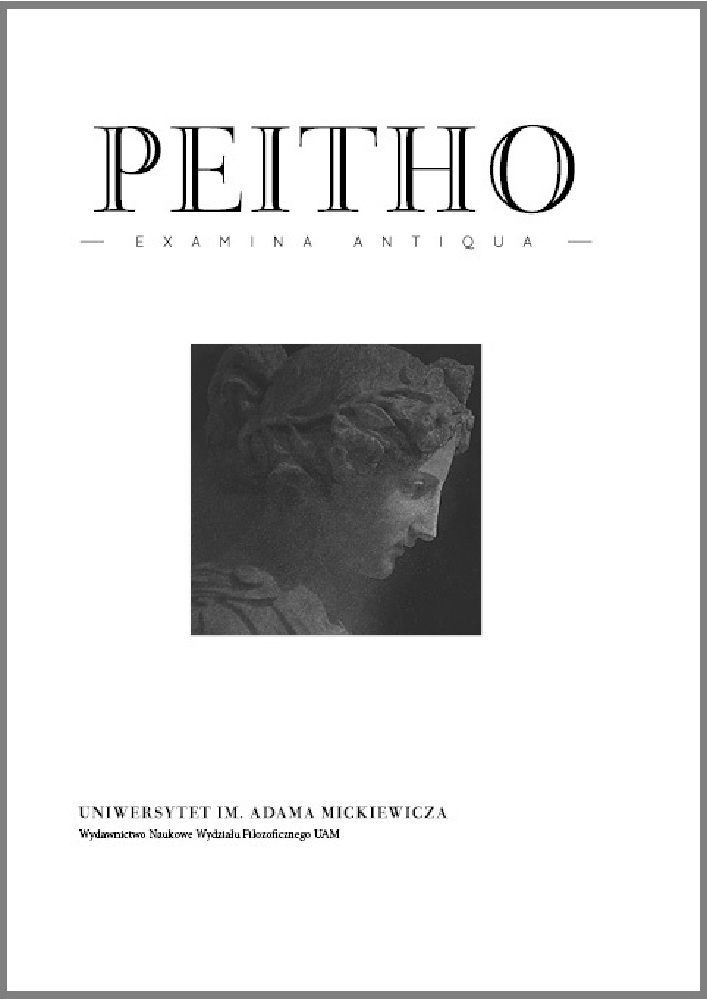Abstract
Walter Kohan has recently observed that Socrates does not seem particularly interested in the opinions of his interlocutors. Consequently, the philosopher is not really involved in a peer to peer relation with them, but rather embarks upon the task of annihilating their ideas. With the situation being as it is, the image of Socrates as a champion of dialogue begins to wobble. While the present paper aims to discuss these claims, a number of issues needs to be accounted for. First of all, the Socratic dialogue does begin in a characteristically symmetrical way, but it becomes more and more asymmetric as the elenchos begins to appear. This is due to the fact the elenchos makes the interlocutors defensive, whereas Socrates can attack freely. Given that, Kohan’s claims seem justified and enlightening, but they should not be regarded as conclusive, since one must neither forget nor undervalue how innovative it was to replace monologue speeches with one-to-one dialogues which offered the opportunity of being involved in unforeseeable conversations.
References
Barnes, J., 2011, J. Barnes et al., Zenone e l’infinito, Sankt Augustin.
Cornea, A., 2009, Lorsque Socrate a tort, Laval.
Danzig, G., 2010, Apologizing for Socrates. How Plato and Xenophon Created Our Socrates, Lanham.
Kohan, W. O., 2009, Sócrates: el enigna de enseñar, Buenos Aires.
Kohan, W. O., 2010, “Sócrates: La paradoja de enseñar y aprender”, in: L. Rossetti, A. Stavru (eds.), Socratica 2008. Studies in Anient Socratic Literature, Bari, pp. 159–184.
Méron, E., 1979, Les idées morales des interlocuteurs de Socrate dans les dialogues platoniciennes de la jeunesse, Paris.
Rossetti, L., 1984a, “Socrate e le scuole socratiche minori”, in: A. Negri (ed.), Grande Antologia Filosofica. Aggiornamento bibliografico, Milano, pp. 87–110.
Rossetti, L., 1984b, «Rhétorique des Sophistes – Rhétorique de Socrate», in: K. Boudouris (ed.), I archea Sofistiki. The Sophistic Movement, Athina, pp. 137–145.
Rossetti, L., 1988, “Come cambia il filosofare quando il linguaggio allusivo entra in scena (con note di commento a Plat. Gorg. 447–448)”, in: F. Bosio (ed.), Questioni di etica e metafisica, Napoli, pp. 29–41.
Rossetti, L., 2000, “Le ridicule comme arme entre le mains de Socrate et de ses élèves”, in: M.L. Declos (dir.), Le rire des Grecs. Anthropologie du rire en Grèce ancienne, Grenoble, pp. 253–268 (poi in Rossetti 2011a, pp. 195–213).
Rossetti, L., 2006, Un Eutifrone interattivo. Tentazioni esegetiche dissociate, Perugia.
Rossetti, L., 2007, “L’Eutidemo di Senofonte: Memorabili IV 2”, in: G. Mazzara (ed.), Il Socrate dei dialoghi. Seminario palermitano del gennaio 2006, Bari, pp. 63–103 (poi in Rossetti 2011a, pp. 55–99).
Rossetti, L., 2008, “El panfleto sofístico, o la comunicación en dos niveles”, in: O. D. Alvarez Salas (ed.), Cultura clásica y su tradición. Balance y perspectivas actuales, México, pp. 293–309.
Rossetti, L., 2010, “Socrate, questo sconosciuto”, Peitho. Examina antiqua 1, pp. 13–30.
Rossetti, L., 2011a, Le dialogue socratique, Paris.
Rossetti, L., 2011b: “Un filosofo senza filosofia”, in: J. Barnes et al., Zenone e l’infinito, Sankt Augustin, pp. 171–183.
Rossetti, L., 2011a, “Anassimene vs. Anassimandro”, in: A. Gostoli, R. Velardi (eds.), Mythologein. Mito e forme di discorso nel mondo antico. Studi in onore di Giovanni Cerri, Roma (in preparazione).
Rossetti, L., 2011b, “Quale filosofia con i bambini e i ragazzi?”, Bollettino della Società Filosofica Italiana (in preparazione).
License
Peitho provides immediate open access to its content on the principle that making research freely available to the public supports a greater global exchange of knowledge.
